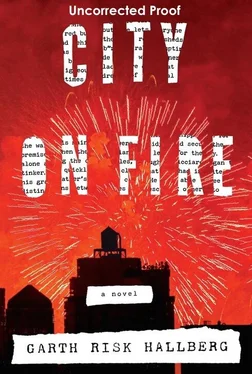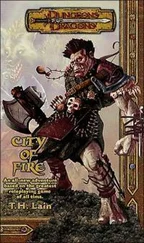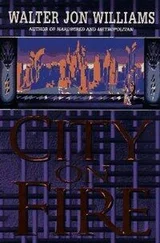Then, just as he reaches Port Richmond, the cobra-lamps over the highway snap on. The sky behind them is the color of a gum eraser — it tends to get that way in summer, something to do with landfill gases — so the brightness is nothing to write home about. Still, it puts a lump in the throat. The neon ninepin out front of BowlRight Lanes flicks through its angles of collapse. Bulbs flash on one of those wheeled letterboards, NOW OPEN WEE DAYS AT 10, referring either to Shenanigans Irish pub or the Greek Orthodox church next door. In the bays of the carwash just before the subdivision entrance, two sponges whirl like dingy sheepdogs, their dreadlocks reaching out for a car that is not there.
Some kind of circuit must have blown on his garage-door opener, too, for as he pulls into the drive the door is going up, then down, then up again. He can see Sherri’s Thunderbird inside, which is odd, unless Patty came last night from Philadelphia to pick her up? He parks in the driveway. The slam of his door sounds overloud, even to him, and startles a few wrens from the neighbors’ privacy hedge. It’s possible he himself is a little frightened. You remember that saying, “Today is the first day of the rest of your life”? There’s something awful about that saying. “Stay here,” he mouths through the window, to the still-silent form in the passenger’s seat. He stands and watches the garage door go up and down, up and down, a few more times before heading inside.
“Sherri?” He makes, by habit, to put his service revolver in the lockable drawer of the table by the front door, but then reconsiders and checks the safety. In the kitchen, the heating element on the coffeemaker has come on with the power, coaxing a curdled deli smell out of yesterday’s coffee, but no one’s there. Their bedroom, too, is empty, the bed with its motel corners. He heads upstairs, leaning heavily on the railing, hardly noticing another door-slam outside. Their bedroom used to be up here until about five years ago, when Sherri complained it was too big — a way of sparing his feelings — and they had movers come in and take everything downstairs to the smaller room where a son or daughter would have slept. Now she calls the old bedroom “a room of Sherri’s own.” She likes to sit on her papasan chair with an afghan in the winter months when the pool is covered over and have her tea and read her book. The curtains that are never drawn are drawn, and the room smells of candlewax, and it is here on the round chair that Pulaski finds his wife, curled up asleep with the earpiece of her little transistor radio in her ear.
He limps toward her, the shag of the carpet swallowing all sound, and when he’s close enough takes out the earpiece. There is no noise. Either the battery died or she turned it off. “Sherr?” He pulls back one of the curtains. Light from the pool redoubles itself on the ceiling, building in wavery white lines, waves of light buffeting this little room. He wants to get closer to her, but to kneel now is basically impossible. He’s stuck looking down, though it feels like she’s the one above.
She opens her eyes. Their blue still startles. “Have you been up all night?” she says. It’s not an angry question, but maybe she’s beyond anger.
“I called. I thought maybe you went to Patricia’s.”
“Why don’t you go to bed, Larry? We’ll talk things over in the morning.”
But he can’t just go to bed. She’s been right here the whole time, not ten miles from the Hamilton-Sweeney Building. “It is the morning,” he says. “What things?”
“You know what things.”
“Look at me sweetheart.” He grasps after the words. “They’re going to be different from here on out. I’m going to be different.”
“Larry, how can I trust you?” There follows a long period of looking at each other. Still, he can’t quite read her face. Because this, too, takes work; when did he forget? Then she reaches up for the sleeve of his sportcoat. “I can’t believe you’re still wearing this, with this heat,” she says. “You know you lost a button.”
He wants her to keep on holding his arm, but it’s too late to say anything. He limps back to the window, pulls his shield from his pocket. The sun seems hungry for it. How you identify yourself: with flashing metal. He pulls up the screen and side-arms the badge with an ease that surprises him. It arcs up, flapping its leather cover like a busted wing until he loses it for a minute in the light, and then it plops, perfect sound, in the shallows of the pool. “Hey!” a girl’s voice says out there. “That was almost my head!”
She is under a flowering catalpa; the most he can see through the scrim of green is the shimmer of a Rangers jersey. “Old man?” she calls. “That you? Is it time for my entrance?”
He turns to look at Sherri. “Honey, you remember how you talked about needing projects to fill the time, if we were going to move upstate? I’ve got someone I think you should meet.”
ANOTHER COAST — THREE WEEKS LATER
HE’D ALWAYS FOUND AIRPORTS SOOTHING SOMEHOW.The in-between-ness. So many bodies, superficially distinct, rushing along the terminals. After his previous misstep, during a decade of semi-exile, he’d spent months in these places, almost as much time as he’d spent in the air. ATL. TGU. MIA. Remarkable, even at the dreaded Paris-Orly, to feel oneself precipitate out of ten thousand other people, merely by refusing the rush. And, wasted time being the handmaid of pointless hurry, he would use this suspension not to loaf, but to prepare for his return. His features were unmemorable. Lenses diluted his eyes. A hat hid his blank head. His luggage was plain and functional as only luggage can be and did not bear his name. He might sit at a gate not his own and assume the affect of a salesman bound for Cleveland, his briefcase full of carpet samples. Or a Kentish auctioneer. A baker from Spokane. Or at a bar in one of the lounges strike up a conversation with whoever looked loneliest, and not a word from his mouth would have weight, nor would it matter. What mattered was setting a goal, however arbitrary, just at the outer limit of the attainable: the target would buy him a drink, say, or carry his bags to the gate. And how did he calibrate these goals, achieve the maximum available yet avoid the steep penalty for non-attainment he’d laid out for himself years ago? Through a patient estimation of his fellow travelers’ secrets. It was secrets that bound people, he believed. Secrets always ready to hand. So many different secrets, and underneath — by virtue of their secrecy — the scandal of their sameness. This one sex, this one drink, or some other, dreary shame.
And did this sameness still cover everything, in light of his own more recent failure? Arriving at LAX for the next leg of his flight, Amory Gould was beginning to wonder.
As he stepped from the cab to the bright sidewalk outside the concourse, a consternation of passengers, shirttails flapping, boarding passes in hand, was flocked around a service counter. There had to be dozens of them, enough to fill a plane. He gathered, in short order, that there had been further setbacks, in this season of systemic malfunction. A mainframe down yesterday in the Rockies, delaying some connections, knocking out others. A cascade effect through all the nodes. And as he was habitually hours early for check-in, and as this irruption offered by its very difference a species of interest, he resolved to pause here at the edge of the edge, as it were, and to study what had lately puzzled him more than any individual: the psychology of a crowd. Yet when he moved to sit upon a nearby bollard, he found someone else already there, taking in the fray. A short woman of Asian extraction. Her baggage rested near her feet. Her sneakers did not quite touch the ground. And what brought him up short was less this than an intimation of affinity, as if she existed right here with him, outside. Above. Where most people wouldn’t have noticed his approach she glanced over, watchful. Well, of course. From her perspective, it would seem as if he were the one seeking company. He struck a match. Bent to puff at his cigarette. “Quite a show, isn’t it?”
Читать дальше












